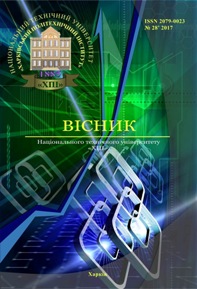On the question of systemological research importance of knowledge management competencies formation
DOI:
https://doi.org/10.20998/2079-0023.2017.28.15Keywords:
knowledge management, competences, competence, knowledge management competences, requirements to competences, competences formation, systemology, systemological analysis, systemological classification analysis, competitivenessAbstract
The relevance of the weakly structured subject area "Knowledge Management Competences" research using the system approach of the noospheric stage of science development is substantiated. For the first time, the research of existing approaches to the definition of the concepts "competence", "competency", " knowledge management competences" made and proposed their system working definitions based on the systemological determinant analysis. The model of the requirements to the professional knowledge and skills of employees possessing knowledge management competences has been researched and developed. The model takes into account the knowledge and skills which are necessary to perform the basic functions and tasks of knowledge management (for example, "the application of the systemological classification analysis for knowledge representation"). The model of requirements to personal knowledge and skills of employees possessing knowledge management competences has been investigated and developed. Such a model formalizes and visualizes the employee basic personal characteristics, which are necessary for the successful performance of professional tasks (for example, "system thinking", "take the initiative," etc.). Research was conducted and the requirements model of the effective organizing of the formation knowledge management competences process (for example, the method of training, develop of a curriculum, etc.) was developed. The requirements to the knowledge management competences and to the process of their formation should be based on the mission, strategy and objectives of the organization, which are reasonably to determine by means of the systemological analysis. The received object models are presented in the article in the form of the Use Case UML diagrams fragments. The results of the research can serve as an information base for the knowledge management implementation in organizations; can be used as the basis for a new systemological information technology of the knowledge management competences formation for the effective and operational formation of such competencies.References
Orlova T. M., A. L. Haponenko. Upravlenye znanyiamy [Knowledge Management]. Moscow, Эksmo Publ., 2008. 550 p.
Menedzhment znaniy: podkhod k vnedreniyu [Knowledge Management: Approach to Implementation]. Available at : http://www.management.com.ua/hrm/ hrm051.html (accessed 15.06.16).
Upravlenie znaniyami kak funktsiya deyatel'nosti organizatsii [Knowledge management as a function of the organization's activities]. Available at : http://dis.ru/library/558/26251. (accessed 15.06.16).
Mel'nikov G. P. Sistemologiya i yazykovye aspekty kibernetiki [Systemology and linguistic aspects of cybernetics]. Moscow, Sovetskoe radio Publ., 1978. 368 p.
Ekonomika znaniy [Economics of knowledge]. Available at : http://www.slideshare.net/ssuser7406d7/3-33038002. (accessed 15.06.16).
Solovyova E. A. Estestvennaya klassifikatsiya: sistemologicheskie osnovaniya [Natural classification: systemological grounds]. Khar'kov, NURE Publ., 1999. 222 p.
Solov'eva E. A. Mathematical Modeling of Conceptual System: a Method and Criteria of a Natural Classification. Automatic Document and Mathematical Linguistics. 1991, vol. 25, no. 2, pp.44–56.
Bondarenko M. F., Matorin S. I., Solovyova E. A. Analysis Of Systemological Tools For Conceptual Modeling Of Application Fields. Automatic Document and Mathematical Linguistics. 1997, vol. 30, no. 2, pp. 33–45.
Bondarenko M. F., Solovyova E. A., Matorin. S. I. Osnovy sistemologii [Fundamentals of systemology]. Khar'kov, NURE Publ., 1998. 118 p.
Ovchinnikov A. V. Universal'naya model' professional'nykh kompetentsiy [The universal model of professional competences]. Available at : http://naukovedenie.ru/PDF/100EVN414.pdf. (accessed 15.03.17).
Panasovska Y., Solovyova K., Danilov A., Panasovska Y., Kobrin M. Knowledge Management Toolset Analysis for Learning Organizations. International Journal "Information Content and Processing". 2014, vol. 1, no 4, pp. 351–359.
Khutorskoi A. V. Sovremennaia dydaktyka [Modern Didactics]. Moscow, Vyisshaya shkola Publ., 2007. 639 p.
Chto takoe professional'nye kompetentsii? [What is professional competence?]. Available at : http://www.twirpx.com/topic/600. (accessed 15.09.16)
Menedzhment znaniy i podgotovka kadrov [Knowledge Management and Training]. Available at : http://cyberleninka.ru/article/n/menedzhment-znaniy-i-podgotovkakadrov. (accessed 15.01.17)
Panasovska Y., Solovyova K., Danilov A., Pishchukhina O., etc. On the Training of Consolidated Information Analysts. International Journal ”Information Models&Analyses”. 2014, vol. 3, no 4, pp. 372–386.
Booch G., Rumbaugh J., Jacobson I. Yazyk UML. Rukovodstvo pol'zovatelya [The UML language. User guide]. Available at : http://sitemonitor.ru/doc/UML_HTM/gl_02.htm (accessed 29.11.16).
Panasovska Y. V. Analiz vymoh spivrobitnykiv orhanizatsiyi do protsesu formuvannya kompetentsiy menedzhmentu znan' [Analysis of the requirements of the organization's employees to the process of forming of knowledge management competencies]. 21-y Mizhnarodnyi molodizhnyi forum «Radioelektronika ta molod u XKhI stolitti». T9 [21st International Youth Forum "Radio Electronics and Youth in the 21st Century". Vol. 9]. Kharkov, NURE Publ., 2017, pp.28–29.
Downloads
How to Cite
Issue
Section
License
Copyright (c) 2017 Вісник Національного технічного університету «ХПІ». Серія: Системний аналiз, управління та iнформацiйнi технологiїAuthors who publish with this journal agree to the following terms:
- Authors retain copyright and grant the journal right of first publication with the work simultaneously licensed under a Creative Commons Attribution License that allows others to share the work with an acknowledgement of the work's authorship and initial publication in this journal.
- Authors are able to enter into separate, additional contractual arrangements for the non-exclusive distribution of the journal's published version of the work (e.g., post it to an institutional repository or publish it in a book), with an acknowledgement of its initial publication in this journal.
- Authors are permitted and encouraged to post their work online (e.g., in institutional repositories or on their website) prior to and during the submission process, as it can lead to productive exchanges, as well as earlier and greater citation of published work (See The Effect of Open Access).


